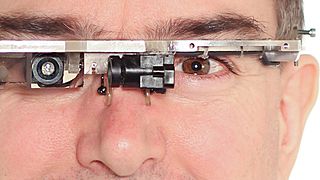A Quote by Astro Teller
Google Glass is the wearable computer that responds to voice commands and displays information on a visual display.
Quote Topics
Related Quotes
If you look through the history of wearables, I was named the father of wearable computing, or the world's first cyborg. But the definition of wearable computing can be kind of fuzzy itself. Thousands of years ago, in China, people would wear an abacus around their neck - that, in one sense, was a wearable computer.
I feel that every day, all of us now are being blasted by information design. It's being poured into our eyes through the Web, and we're all visualizers now; we're all demanding a visual aspect to our information. There's something almost quite magical about visual information. It's effortless; it literally pours in.
When I watch TV, and TCM isn't on, I just switch channels and look at all the information about everything. The internet is perfect for that, which is why I didn't really want to get a computer in the first place. I thought, "If I have a computer and know about this whole Google thing, I am not going to be able to sit still for a second; I'm going to think about something and then have to look it up." I have never bought myself a computer or a phone, but guys in my life have bought them for me, for whatever reason. So now I have them.
Stop looking at the Web as merely a display opportunity and not a way to interact. That does not create a new business model, it just shifts one that isn't growing and is outdated. The reason sites like Google are stealing advertisers from daily newspapers is not because Google has more eyeballs. It's because Google used the interactivity of the Web to deliver a new, better way to advertise.



































